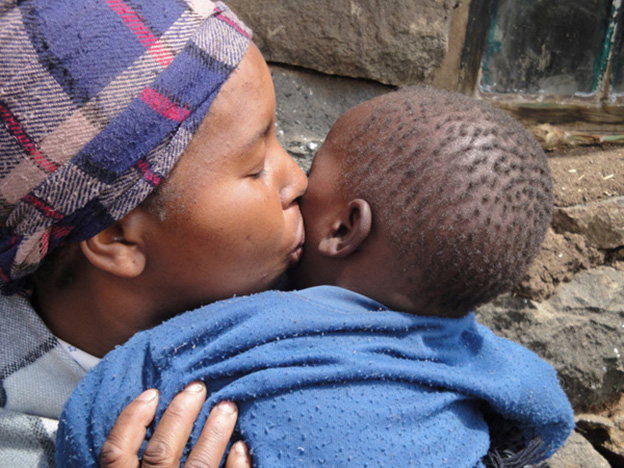HIV-infected mother’s milk could contain hundreds of shields against virus

Maamohelang, an HIV-positive mother, with her infant named Rebone. 'There has been this paradoxical finding that babies breastfed exclusively by HIV-infected mothers are significantly protected against getting infected with HIV, compared to babies who are fed a combination of breast milk, other liquids or foods,' says McMaster's Ken Rosenthal. 'This has led us to try to understand how their immune system is affected by the exposure to HIV in utero and when they’re nursing.'
In the centre of Cape Town, just a short drive from the city’s iconic Table Mountain National Park, is one of Africa’s most advanced research facilities dedicated to eradicating HIV/AIDS.
It’s here, at The Cape Town HIV Vaccine Trials Network Immunology Lab (CHIL), where McMaster’s Dr. Ken Rosenthal recently spent six months as the first visiting scientist, collaborating with a consortium of local researchers and educators to conduct cutting-edge HIV research.
“South Africa has the highest burden of HIV disease, and therefore is a focus of many current and upcoming HIV vaccine trials,” says Rosenthal, a professor in the Department of Pathology and Molecular Medicine. “Because HIV is primarily affecting people in sub-Saharan Africa, we really are at the frontline.”

While in South Africa, Rosenthal and his colleagues from the University of Cape Town, Stellenbosch University and Nigeria’s Institute of Human Virology answered the call for novel research concerning mother-to-child transmission of HIV. Collectively, they launched a longitudinal cohort study called “Innate Factors Associated with Nursing Transmission,” or INFANT, which continues to follow 500 HIV-infected mothers and their uninfected babies from South Africa and Nigeria.
The study, funded through the Canadian Institutes of Health Research (CIHR) and the Canadian HIV Vaccine Initiative (CHVI), was inspired by a seemingly contradictory discovery.
“There has been this paradoxical finding that babies breastfed exclusively by HIV-infected mothers are significantly protected against getting infected with HIV, compared to babies who are fed a combination of breast milk, other liquids or foods,” he explains. “This has led us to try to understand how their immune system is affected by the exposure to HIV in utero and when they’re nursing.”
Rosenthal and his colleagues speculate that there are a lot – perhaps hundreds – of innate immune factors in breast milk that act like tiny shields, blocking the virus from entering the bloodstream.
“When a mother is breast feeding multiple times a day, she is essentially delivering a threshold level of protective innate immune factors that stop the virus from infecting the infant,” says Rosenthal. “In fact, we’ve identified one factor that, in addition to its anti-inflammatory activity, can bind to and inhibit infectivity of HIV.”
According to the World Health Organization (WHO), an estimated 1.4 million women living with HIV become pregnant every year. If left untreated, they have a 15-45 per cent chance of transmitting the virus to their children during pregnancy, labour, delivery or breastfeeding.
However, this risk drops to approximately 1 per cent if antiretroviral drugs are administered to both mother and child during and after pregnancy.
In South Africa, the rollout of antiretroviral drugs has been efficient, according to Rosenthal, and to ensure this continues, investigators at CHIL are now moving forward with a series of ambitious HIV vaccine clinical trials.
“Our INFANT study, in part, has allowed us to better understand how HIV-exposed uninfected infants of HIV-infected mothers respond to normal paediatric vaccinations,” he explains. “Building on studies like this is critical to the discovery and development of safe and effective HIV vaccines.”
Since his return to McMaster only a few months ago, Rosenthal says he often looks back on his time as the first visiting scientist at CHIL with tremendous satisfaction, describing the experience as a “fantastic opportunity.”
“At CHIL I was fortunate enough to work with a group of friendly, dedicated and motivated colleagues who demonstrated on a daily basis a commitment to ending this epidemic.”
Dr. Ken Rosenthal is a member of the Michael G. DeGroote Institute for Infectious Disease Research.

